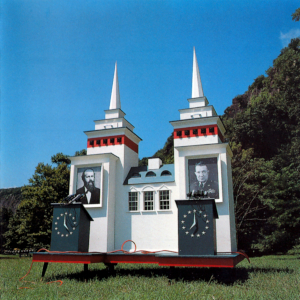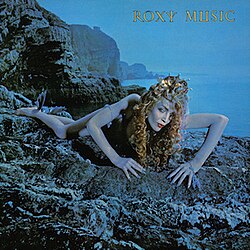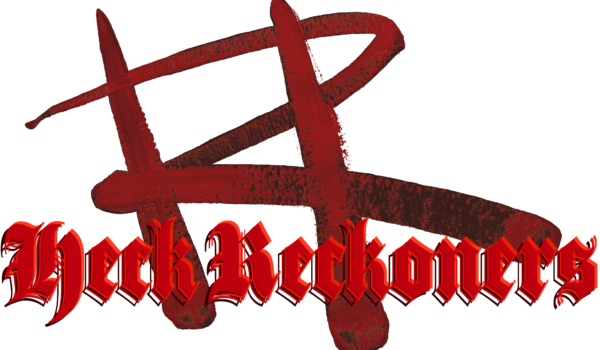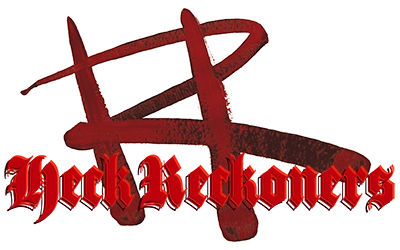For the first time since AC/DC released Power Up in 2020, a metal band has reached the top of the Billboard 200 – two actually. Ghost’s Skeletá topped the chart back in March, and Sleep Token’s Even In Arcadia did so earlier this week. Fans of metal, rock, and guitar music hope it’s a return to the 1980s heyday when Guns N’ Roses, Metallica, Def Leppard, Van Halen, and Mötley Crüe sold so many records that their band members could reach heretofore unheard of levels of intoxication and assholery and suffer almost no consequences whatsoever. It won’t be – Skeletá drop from number one to 58 is the tenth largest of all time – but it did get me wondering about what makes a rock album go big in this fragmented music environment.
Nic had me listen to Even In Arcadia, an album he likes by a band he knows. Despite being our band’s resident metalhead (an appellation I wear lightly, because unlike most, I listen to other music than metal, so I’m a fucking “casual”) and them being the biggest band in the world, I don’t actually know Sleep Token. My first exposure came from Eli Enis’s brutal 2.3/10.0 takedown of Acadia in Pitchfork, in which he said it “mostly offers sanitized pop-rap with all the sexed-up verve of Droopy the dog.” There’s some of that old school Pitchfork bitchiness that has mostly disappeared since they became Rolling Stone for millennials. Nic asked if I could at least listen to the album with open ears. I assured him that I’m a professional music critic (even though I’m not) and can listen to it with an unbiased mind (even though I can’t).
I found the album…pretty boring despite the dozen or so genres it tries. But I don’t find it as dire as Enis, who concluded that “if metal has to reconfigure itself into Benson Boone with a Spirit Halloween gift card in order to reassert its commercial authority, then maybe it’s better off toiling away in basements.” (Again, ouch.)
Personally, I don’t think we have to worry about metal selling out. Metal sold out from day one, and it has nevertheless continually created greatness. After all, when Bon Jovi was topping the charts with Slippery When Wet, Slayer was recording Reign in Blood. There’s room enough in the metal sphere for festival-headlining snooze acts (I mean Sleep Token have “sleep” in their name) and exciting, new basement-dwellers who’ll rip your face off. (There’s also, of course, room for the band Sleep, who are a bit of both.)
The fact is, I could tell from Sleep Token’s influences that I wouldn’t really like them. Because the band never speaks to the press – they perform in masks and are publicly anonymous – it’s their fans who say they sound like Meshuggah, After the Burial, Slipknot, and, uh…Bon Iver?! That’s not exactly a Murderer’s Row of my favorites. Oh, and there’s some R&B and EDM mixed in there for the girls.
Ironically, Arcadia sounds less like a metal album and more like an R&B album with some djent and blast beats. Its vocals-first production makes the most space for lead singer Vessel’s clear, motive voice. In a very un-metal turn, all the other instruments play backup. Oh, and there are a lot of other instruments. This is not a four-grubby-guys-in-a-garage production.
Their first single “Emergence” is a lot. It’s a ballad that turns into, uh, reggaeton, before emerging (Jesus, I’m a hack) as nu metal. It ends with a sax solo. “Carmel” has the blast beats and marimba. “Even in Arcadia” has tinkly piano and Bon Iver-esque vocoder. “Damocles” spends three minutes sounding like a Bruce Hornsby tune until the guitars come in. And when they do, they don’t shred or pummel or rock so much as just “be heavy,” as if they were dialed in on a plugin called “Heavy Metal Guitar.”
On the closer “Infinite Baths,” keyboards overpower the guitars until five minutes in, at which point the band starts screaming and chugging, before fading out without ever really exploding. I feel they really could’ve used a hot shit guitar solo at the end there. (I guess I should be happy they didn’t spring for more sax.)
You’ll notice I’m mentioning guitar a lot. Part of that is provincial (it’s my instrument, homes), but part of it is that I really think Arcadia neglects the instrument. As popular forms of music move away from the electric guitar (pop, R&B, rap, and dance are written on keyboard and laptops), metal remains one of the last vestiges of guitar dominance. But when even metal can be assembled in Ableton, as Even In Arcadia feels like, I’m kinda like, what’s the point of having genres?
Maybe, in fact, that’s the exact reason the album has attracted so many listeners. Maybe it has the perfect ratio of blast beats, grindcore squeals, and djent breakdowns to moody R&B to land itself a giant audience. Maybe there’s enough metal dissonance to keep longhairs happy and enough sad-sack R&B crooning to keep their normie girlfriends and boyfriends from throwing their cellphones in the toilet. Maybe this is precisely the amount of metal that fits into pop music without making it radioactive.
That said, even if a thousand metal bands try to follow in Sleep Token’s path, I’m sure, as long as kids are going out to the garage to play with their friends, and leaving their laptop in their bedrooms, metal will be fine. Besides, a percentage of those normie girlfriends and boyfriends are going to discover that they’re actually guitar perverts at heart and are going to move from Sleep Token, to tokin’ with Sleep.
For today’s Heck Record listen to Agalloch’s third album, 2006’s Ashes Against the Grain. Like Even in Arcadia, it’s a very clean, moody, intense record. And its rave ups and breakdowns don’t feel like they were programmed and quantized.







Comments